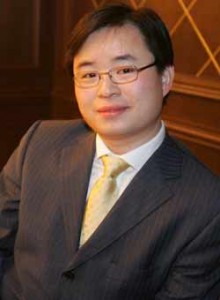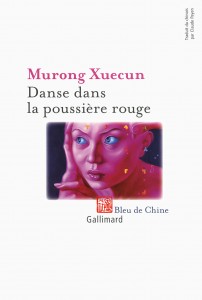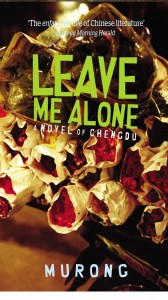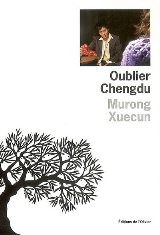 Murong Xuecun is not yet forty years old. He is one of the brightest writers of a generation which is now being translated.These writers, like Han Han and Annie Baobei, are born with the internet. Three years ago, I regretted the small number of translations of this young generation, therefore we can welcome the release of “Dancing in the red dust”, translated by Claude Payen who is also the translator of “Leave me alone: a novel of Chengdu” published in 2006.
Murong Xuecun is not yet forty years old. He is one of the brightest writers of a generation which is now being translated.These writers, like Han Han and Annie Baobei, are born with the internet. Three years ago, I regretted the small number of translations of this young generation, therefore we can welcome the release of “Dancing in the red dust”, translated by Claude Payen who is also the translator of “Leave me alone: a novel of Chengdu” published in 2006.
“Red Dust,” the human world
As the author says: “I danced in it all my life. Gratitude and revenge, love and hate, I can settle my accounts, but I cannot get rid of it (p. 204). ” A highly focused world, the legal professions: lawyers and judges as well as their “side lines”, police and prisons.
The narrator Wei Da, after law school, sees his initial idealism confronted with the corruption in the world of justice. He adapts quickly!
A “lawyer is a man who must remember three words! Deception! Obedience! Simulation!
• “Deception in front of the customer. He should boast, exaggerating his competence and relationships.
• docility before the judge. He should behave like a little obedient boy.
• Simulation to the public. He must show that his sole purpose is to ensure that justice is carried out impartially … “
In fact, “the lawyer has only one goal, to make money.” (P.12)
It is an environment that the author, who was a lawyer with several companies, knows particularly well. His hero is a member of a business law firm, he explains to the reader the fee systems and especially commissions for the recovery of debts or the solution of disputes between companies.
You can earn lots of money if you are well known, but a lawyer is threatened by colleagues and even by young assistant (s) desperate to get a place in the sun.
 A condition of success is to establish “successful” relationships with judges and police. All corruption methods are described such as gifts, envelopes, original antiques presented as worthless copies and especially evenings with willing young women or prostitutes!
A condition of success is to establish “successful” relationships with judges and police. All corruption methods are described such as gifts, envelopes, original antiques presented as worthless copies and especially evenings with willing young women or prostitutes!
Lawyers and judges: contempt and symbiosis
The judges follow the same university studies, but compared to lawyers they earn very little (7 000 Euros per annum for an ordinary judge). “Judges and lawyers despise each other but they cannot do without each other.”
Our hero Wei is trying to be impartial, “compared to political leaders, judges are low earners who can only gain some minor benefits from the right or the left whereas a mayor can become a billionaire.”(p.180)
Among all these judges, only one is honest, Pan Zhiming, a former friend from university but his arrogance, his clumsiness and inflexibility only manage to create enemies for himself. He works a lot but had no promotion. He is separated from his wife but refuses divorce. Wei tries to help him but with no success .. ! Fights with other judges will lead Pan Zhiming in prison but in Tibet where he teaches law to other prisoners, he “kept intact his faith in human nature.”(p.438)
 This is not the case for Wei, his cynicism is boundless: “Over the years, I developed an armour that made me invulnerable. I have no friends, I never tell the truth and do not trust anyone, which according to the criteria of our time allows me to be considered a highly respectable character. “(p.50)
This is not the case for Wei, his cynicism is boundless: “Over the years, I developed an armour that made me invulnerable. I have no friends, I never tell the truth and do not trust anyone, which according to the criteria of our time allows me to be considered a highly respectable character. “(p.50)
“Never be moved, never forgive”
His relationships with women are complex. Only his mother escapes his cynicism but he sees her not very often, yet it is a “weakness” that cost him dearly when he is in prison. He is divorced, his wife was cheating on him and threatened him demanding money. His assistant tries by all means to be entrusted some business.
As he says, “In this world, the worst poison is kindness, the most beautiful mushrooms are the most poisonous, the most gracious smiles are those who hide the sharpest knives.”(p.346)
Men and women rival with cynicism. His relationship with his mistress Xiao Li is complex and interesting. It will cause his downfall. She wants to marry him, but with one of her former lovers, blackmails Wei. He is hardly more coherent, softens, want to give up … We do not know how to disentangle fact from fiction.
“I’m a criminal with words”
Murong Xuecun first published his novel in 2007 on his blog. This release by episodes has sometimes a negative impact on the structure of the book, a chapter should preferably tell a complete story …
The result is a book which is too long (570 pages), sometimes repetitive; the description of all imaginable forms of corruption or scam finally becomes a bit boring specially as the general structure of the plot is rather loose. Also cynicism displayed on nearly each page is not always useful …
But Murong Xuecun appeals to us with images and jokes that made him famous on the internet, also a lot of humor and often welcome.
The book was published in 2008 after severe discussions with the censorship; 20,000 words were deleted and two alternative epilogues were written. “Leave me alone…” had also experienced some difficulties but a new publication on the internet, as often is the case, helped to release the original text.
 His editor, Mr. Lu believes that his novels are too dark, “he is a lonely nihilist who believes in nothing.” Surprising comment as Murong Xuecun is one of the writers living in China, who takes the biggest risks to try to change the system. He still can travel but considers himself threatened especially after the closure of his Weibo accounts (the “Chinese Twitter”) last May.
His editor, Mr. Lu believes that his novels are too dark, “he is a lonely nihilist who believes in nothing.” Surprising comment as Murong Xuecun is one of the writers living in China, who takes the biggest risks to try to change the system. He still can travel but considers himself threatened especially after the closure of his Weibo accounts (the “Chinese Twitter”) last May.
A disaster because he is followed by 8.5 million people and has posted 1900 messages totaling 200 000 words.
The next book to be published in France in 2014, “How can anyone be so ignorant” is not a novel but a report on a pyramid selling system, a successful scam he uncovered at great risk in Shangrao, a small town near Shanghai.
He denounced the system to the local police, published a book that was awarded the prize by the People Literature. But he could not deliver his acceptance speech! This text, translated by Rue89 is a superb illustration of the devastations of censorship and self-censorship.
But the author remains optimistic: “Like many people, I dream of living in a perfect world, but I’m always willing to use all my energy in an imperfect world.”
Bertrand Mialaret
” Danse in the red dust” by Murong Xuecun, translated into French by Claude Payen. Ed Bleu Chine-Gallimard. September 2013, 570 pp., € 29.
“Leave me alone: a novel of Chengdu” Make Do publishing. May 2013





